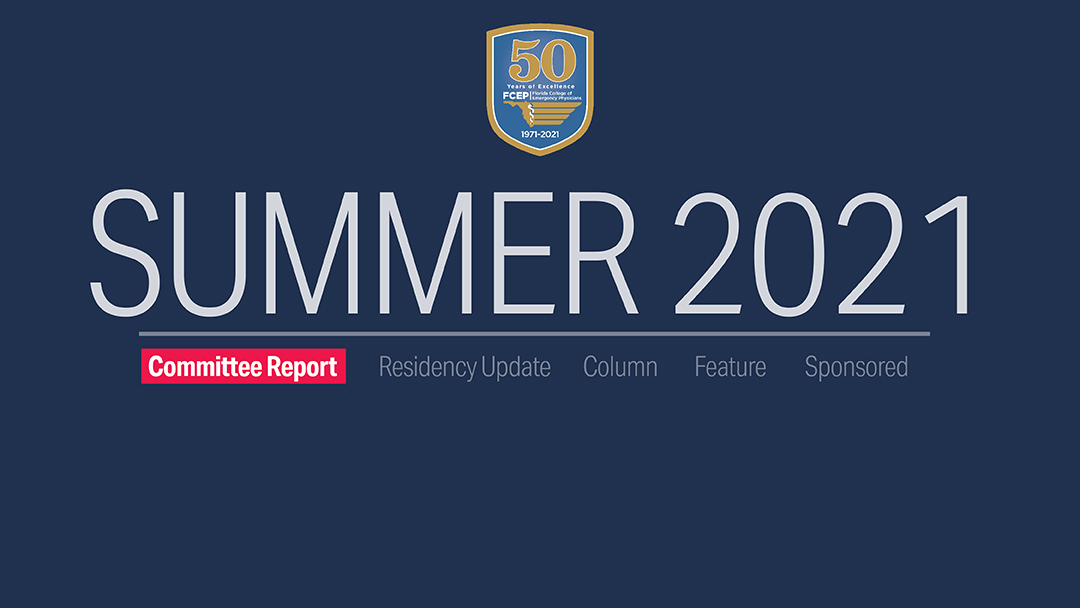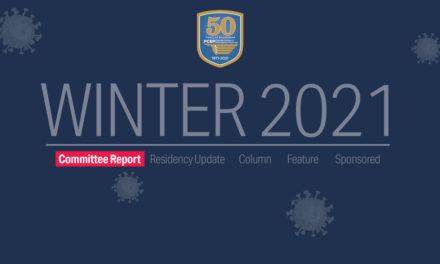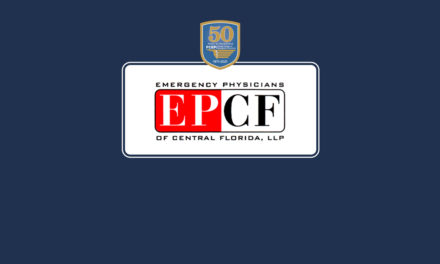Government Affairs: 2021 Post-Legislative Session Report
Though summer finds us in the early days of hurricane season, it finds us in the doldrums of political activity in Tallahassee. After a Legislative Session that was less focused on healthcare than previous years, but still heavily focused on pandemic-related measures, along with a quick gambling-focused special legislative session that followed, Tallahassee has emptied out until the fall. Since this is a non-election year, committee weeks for the State Legislature will begin with the return of college football. We will continue to push for changes in the application of the surprise medical billing laws that are currently on the books, to make insurers come to the table and work with us on an even footing. We should also anticipate another round of attempts by special interests at broadening scope-of-practice laws for other healthcare providers. FCEP will continue to work with the FMA and stand firmly against independent practice for mid-level providers.
While this time of year is not filled with activity, and many of us have our eyes towards getting back out, traveling and visiting others, I encourage everyone to remember the key element that allows us to meet with key players in Tallahassee: donations from FCEP’s Political Action Committee (PAC). This committee, funded by your donations, opens doors for us that would otherwise be closed. We have a great advocacy team representing emergency physicians on the ground that is happy to give time to represent you, but we need your help to make the biggest impact. Please donate to FCEP’s PAC, and let us be there to give you a voice.
I hope to see many of you at Symposium by the Sea this August in Naples. As always, FCEP will continue to monitor any potential bills shaping physician rights, scope of practice, balance billing, opioid treatment and any other potential bills that can affect the practice of emergency physicians. Thank you all for your hard work caring for patients each and everyday across this state. Even though the spotlight is no longer on us, the work each one of you do day in and day out is of no less importance. As Mel Herbert of EMRAP always likes to remind us, “Remember, what you do, matters.” If you have any concerns about issues that you think can or should be addressed, or if you would like to learn more ways to be involved in advocacy, please email me anytime at BlakeBuchanan87@gmail.com.
2021 Post-Legislative Session Report: Governor’s Final Actions
* = 2021 priority issue
VETOED:
SB 54: Mandatory BI/PIP Repeal*
With SB 54 vetoed by the Governor, no changes will be made to Florida’s no-fault auto insurance market this year. However, we anticipate this issue to surface again next session. FCEP did negotiate in good faith with the bill sponsors, and was able to secure the following items in the legislation (now vetoed):
- Physician set-aside retained for emergency physician care (5K)
- Mandatory offer of med-pay with written opt out if coverage isn’t selected, otherwise presumed to have a $10k med-pay benefit
SIGNED INTO LAW:
SB 716: Consent for Pelvic Exams*
FCEP worked hand-in-hand with other specialties affected by the 2020 passage of the written consent for pelvic exam legislation. As a result, FCEP was able to secure the necessary changes in SB 716 to mitigate the unintended negative consequences to emergency care.
FCEP started by clarifying that the exemption for emergency care extends to both the exam to determine an emergency medical condition in the ER AND the care needed post exam. The legislation also:
- Amends, narrows, and simplifies the definition of “pelvic examination” to exclude a visual assessment, imaging or non-diagnostic medical or surgical procedure.
- Narrows only to require written consent for anesthetized or unconscious patients outside the ER and to require verbal consent from any conscious patient
- Adds three new exceptions, thereby allowing an examination without consent, related to emergency medical conditions outside the ER, a child protective investigation, and certain criminal offenses against a child; and
- Provides that a single written consent for a pelvic examination may authorize multiple health care practitioners or students to perform a pelvic examination on a pregnant woman having contractions.
SB 72: COVID Liability Protections*
FCEP made liability protections for emergency physicians working during the pandemic a priority and applauded the Florida Legislature passage of SB 72 as the first bill of the Session. Below are highlights that will protect emergency physicians:
- Plaintiff must prove gross negligence or intentional misconduct
- Protection when the emergency physician substantially complied with authoritative or applicable government-issued health standards or guidance
- Protection for delaying or canceling a medical procedure due to government-issued health standards or guidance.
- 1-year statute of limitation
HB 431: Physician Assistants*
FCEP is happy to report that HB 431 no longer grants independent practice to PAs as originally filed, but instead increases the number of PAs a physician can supervise (1:10, previously 1:4). We were also successful in killing the ARNPs push to expand their independent practice outside the practice of primary care.
The bill allows a PA to do the following:
- Prescribe psychiatric mental health controlled substances to minors under certain circumstances;
- Procure certain medical equipment and devices;
- Supervise medical assistants; and
- Sign and certify documents that currently require a physician’s signatures including, but not limited to, Baker Act commitments, do-not-resuscitate orders, school physicals, and death certificates. The bill specifies that a PA may not sign for medical marijuana certifications under s. 381.986, F.S., or workers’ compensation medical examinations required to determine maximum medical improvement under s. 440.02, F.S., and an impairment rating under s. 440.15, F.S.
The bill also authorizes physician assistants to directly bill for and receive payments from public and private insurance companies for the services they deliver.
SB 676: Specialty License Plates*
SB 676 passed the Florida Legislature with numerous specialty license plates, and our “Support Health Care Heroes” license plate was one of them! Once they are available for pre-order, we encourage the entire health care community to purchase one and show your support. Funds generated from the sales will be deposited in the EMS Trust Fund. Stay tuned for more information from FCEP.
SB 262: Dispensing Medicinal Drugs
Currently, an authorized prescriber may dispense up to a 24-hour supply of a medicinal drug to an emergency department patient of a hospital that holds an appropriate institutional pharmacy permit, provided that the treating physician determines that the medicinal drug is needed and that community pharmacy services are not readily accessible to the patient. If the patient needs more than a 24-hour supply of a drug, the prescriber must provide the patient with a prescription for use after the initial 24-hour period.
SB 262 extends patient eligibility to include a patient discharged from a hospital (inpatient). The bill also authorizes a hospital pharmacy to dispense the greater of a 48-hour supply of a medicinal drug or a supply of a medicinal drug that is sufficient to last a patient until the end of next business day. The bill also authorizes a hospital pharmacy to dispense up to a 72-hour supply of a medicinal drug if the patient is located in an area in which a state of emergency is declared. The bill corrects current statutory language to reflect that it is the hospital pharmacy that dispenses the medicinal drug, rather than the prescriber.
HB 157: First Aid Training in Public Schools
HB 157 requires school districts to provide basic training in first aid, including one hour of cardiopulmonary resuscitation (CPR) instruction, for public school students in grades 9-11. Basic CPR instruction for students is currently encouraged, but not required by state law. The bill provides that the CPR training must be based on a nationally recognized program that uses the most current evidence-based emergency cardiovascular care guidelines. The instruction must allow students to practice the psychomotor skills associated with performing CPR. If a school district has the necessary equipment, students must also be provided instruction in the use of an automated external defibrillator. The bill also encourages school districts to provide basic first aid training, including CPR instruction, to students in grades 6-8.
HB 1157: Freestanding Emergency Departments
Continuing on the House Speaker’s health care transparency initiates from previous sessions, the Legislature passed HB 1157. Quoting directly from testimony provided by the bill sponsor: “Consumers sometimes mistake FEDs for urgent care centers because these facilities can often look and feel like urgent care centers. As a result, they may be surprised to receive a bill that is significantly higher than expected. Unlike an urgent care center, which provides non-emergent care and only charges a physician fee, a FED provides emergent care and charges a physician fee and a facility fee. The average cost for primary care at an urgent care center is $193, compared to over $2,000 in an emergency room.”
This bill:
- Defines the term “hospital-based off-campus emergency department” (HBOCED) and amends current law to draw a stronger distinction between HBOCEDs and urgent care centers (UCC).
- The bill restricts an HBOCED from holding itself out as a UCC and requires that a HBOCED clearly identify itself as an emergency department (ED) and post signage in conspicuous areas that specified that the HBOCED is an ED and not a UCC.
- The bill also includes similar identity transparency requirements for all HBOCED advertising.
The bill requires AHCA to publish the following information on its website, which must be updated at least annually:
- A description of the differences between a HBOCED and an urgent care center;
- At least two examples illustrating the cost differences between non-emergent care provided in a hospital emergency department setting and an urgent care center;
- An interactive tool for consumers to locate local urgent care centers; and
- Steps to take in the event of a true emergency.
The bill also requires a health insurer to post on its website at least two examples illustrating the impact on insured and insurer paid amounts of inappropriate utilization of non-emergent services and care in a hospital ED setting, compared to a UCC and an interactive tool to locate in-network and out-of-network UCCs.
HB 805: Volunteer Ambulance Services
The bill provides a legislative finding that it is in the public interest to foster the development of emergency medical services that address religious sensitivities and recognizes the value of augmenting existing county and municipal emergency medical services with those provided by volunteer service organizations.
The EMS Medical Directors were successful in placing into statute several safeguards in the implementation of HB 805:
- Exempts ONLY certain not-for-profit faith-based volunteer first responder agencies who have been operating in this state for at least 10 years, and which provide advanced or basic life support services solely through at least 50 unpaid licensed emergency medical technician or paramedic volunteers, from COPCN requirements.
- To be exempt from the COPCN requirements, the volunteer ambulance service MUST also provide services free of charge, not receive government funding (excluding specialty license plate proceeds), provide a disclaimer on all written materials that the volunteer ambulance service is not associated with the state’s 911 system, and meet other requirements as outlined in the bill.
- The COPCN exemption created in the bill may also ONLY be granted to no more than four counties.
The bill requires an applicant to take all reasonable efforts to enter into a memorandum of understanding with the EMS licensee within whose jurisdiction the applicant will provide services in order to facilitate communications and coordinate emergency services for situations beyond the scope of the applicant’s capacity, and for situations of advanced life support that are deemed priority 1 or priority 2 emergencies.
The bill also makes it clear that an EMS or fire rescue services provider operated by a county, municipality, or special district is responsible for the care and transport of an unresponsive patient if a volunteer ambulance service arrives at the scene of an emergency simultaneously with such a provider and a person authorized to consent to the medical treatment of the unresponsive patient is not present.
Staff Analysis | Senate End of Session Summary
SB 388: Injured Police Canines
Working with FCEP and the EMS Medical Directors, SB 388 was amended to address our number one concern: a veterinary clinic vs. an emergency department as the best place for injured canines to be treated. Thus SB 388 authorizes an emergency service transport vehicle permit holder to transport a police canine injured in the line of duty to a veterinary clinic or similar facility if no person requires medical attention or transport when the canine needs it. The bill authorizes EMTs and paramedics to provide emergency medical care to an injured police canine at the scene of an emergency or while the canine is being transported. The bill provides civil and criminal immunity for EMTs and paramedics providing emergency care to an injured police canine and exempts them from the application of the veterinary practice act for providing medical care to a police canine injured in the line of duty.
SB 272: Rare Disease Advisory Council
SB 272 creates section 381.99, Florida Statutes, to establish the Rare Disease Advisory Council (Council) adjunct to the Department of Health (DOH). The Council is tasked with providing recommendations to improve the health outcomes of Floridians who have a rare disease, defined as a disease that affects fewer than 200,000 people in the United States. The bill establishes the membership of the Council, and requires that the Council first meet by October 1, 2021, and provide its recommendations to the Governor and the State Surgeon General by July 1 of each year beginning in 2022.
The Council must:
- Consult with experts on rare diseases and solicit public comment to assist in developing recommendations on improving the treatment of rare diseases in this state.
- Develop recommended strategies for academic research institutions in this state to facilitate continued research on rare diseases.
- Develop recommended strategies for health care providers to be informed on how to more efficiently recognize and diagnose rare diseases in order to effectively treat patients.
- Provide written input and feedback to the DOH, the Medicaid program, and other state agencies on specified matters.
HB 183: Office of Minority Health
In Florida, minority populations experience higher rates of illness and death from health conditions such as heart disease, stroke, specific cancers, diabetes, HIV/AIDS, mental health, asthma, and obesity. The Office of Minority Health and Health Equity, housed within the Department of Health (DOH), is responsible for helping to improve health and healthcare outcomes for racial and ethnic minority communities by developing or advancing policies, programs, and practices that address health, social, economic, environmental, and other factors that impact health. Under current law, the Office must be headed by a Senior Health Equity Officer, who must administer the Closing the Gap grant program in a manner that maximizes the impact of the grants in achieving health equity.
HB 183 requires the Office to develop and promote statewide implementation of policies, programs, and practices that increase health equity for racial and ethnic minority populations in Florida. The bill requires the Office to work with other state agencies, organizations, and providers to improve the health of racial and ethnic minority populations through data analysis and the development of health policies and programs that will help eliminate health disparities. The bill requires one representative from each county health department to serve as a minority health liaison and requires minority health liaisons to assist the Office in the implementation of the bill. The bill also authorizes the Office to serve as a liaison to and assist the federal Offices of Minority Health and Regional Health Operations, as appropriate.
Senate End of Session Analysis
HB 1381: Maternal Health Outcomes
HB 1381 allows the Closing the Gap (CTG) grant program to fund projects directed at decreasing racial and ethnic disparities in severe maternal morbidity and other maternal outcomes. The bill also adds maternal health programs to existing community-based programs the DOH is required to coordinate. The bill creates telehealth minority maternity care pilot programs in Duval and Orange Counties to expand the capacity for positive maternal health outcomes in racial and ethnic minority populations. The pilot programs are required to use telehealth or coordinate with prenatal home visiting programs to provide services and education to eligible pregnant women and provide training to participating health care practitioners and other perinatal professionals. The bill requires that legislative appropriated funds for the CTG grant program be used to fund the pilot programs. The bill also requires that the DOH’s Division of Community Health Promotion and Office of Minority Health and Health Equity work together to apply for available federal funds to assist in the implementation of the bill.
HB 701: Behavioral Health Care Services
Building on FCEP’s focus of increasing access to mental health coverage, especially as we struggle to find patients access to care outside the ED, HB 701 requires the Department of Financial Services (DFS) to submit a report, by January 31, 2022, to the Legislature and the Governor regarding complaints received from insureds and subscribers about the adequacy of coverage and access to mental health services through their individual or group health insurance policies or health maintenance organization (HMO) contracts.
Further, the bill requires insurers and HMOs to provide insureds and subscribers a direct notice regarding the federal and state coverage requirements for mental health services, as well as contact information for the Division of Consumer Services within the DFS. Insurers and HMOs are also required to make this information available on their website.
HB 673: DNA Evidence Collection
HB 673 creates “Gail’s Law” to require FDLE, subject to an appropriation and no later than July 1, 2023, to create and maintain a statewide database tracking the location, processing status, and storage of each Sexual Assault Kits (SAK or rape kits) collected after the database is implemented.
The database must be accessible by law enforcement, alleged victims, and alleged victims’ parents, guardians, or other representatives. The database must track the status of a SAK from its collection throughout the criminal justice process all the way through the kit’s destruction. The bill requires FDLE to adopt rules and specified entities to participate in the database in accordance with those rules. The bill also requires FDLE to ensure that every victim or victim’s representative is notified that the database exists and is provided with instructions on how to use it. Under the bill, a victim must be notified when the analysis of his or her SAK results in a DNA match, but such notification must not release any identifying information of the match. The bill authorizes FDLE to phase in participation according to region, volume of kits, and other criteria, but requires all entities in the chain of custody to fully participate in the statewide database no later than one year after it is created. The bill also requires FDLE to apply for any available grant funds to assist in implementing the database.
SB 1934: Health Care Practitioner Discipline
After two pediatricians were arrested on child pornography, legislators were shocked that such an arrest did not result in an automatic suspension of their medical license. Thus, legislation was passed to make sure certain offenses trigger action by DOH.
- Amends s. 456.072, F.S., to add to the list of offenses that are grounds for disciplinary action against the license of a health care practitioner regulated by the Department of Health (DOH), for: Being convicted, found guilty, pleading guilty, or pleading nolo contendere, regardless of adjudication, to any of the crimes listed in s. 456.074(5), F.S., as amended; or Attempting, soliciting, or conspiring to commit an act that would constitute a crime listed in s. 456.074(5), F.S., or similar crime in another jurisdiction.
- Amends s. 456.074(1), F.S., to add homicide to list of offenses that require the DOH to issue an Emergency Suspension Order (ESO) and broadens the application to any health care practitioner, instead of those currently listed in statute, if he or she pleads guilty to, is convicted or found guilty of, or who enter pleads nolo contendere to, regardless of adjudication.
- Amends s. 456.074(2), F.S., to specify offenses that require the DOH to issue an ESO against any health care practitioner who is arrested for such offenses. The bill requires the DOH to issue an ESO if a health care practitioner is arrested for committing or attempting, soliciting, or conspiring to commit any one of the listed criminal offenses involving a child, an individual with mental or physical disabilities, or the elderly, or a similar offense in another jurisdiction.
- Directs the Office of Program Policy Analysis and Government Accountability (OPPAGA) to analyze state laws and rules relating to grounds for health care practitioner discipline and ESOs of licenses, specifically with respect to criminal offenses, and to report to Executive and Legislative Branch leadership by January 1, 2022.
Signed into Law & Glitch Bills Are Needed (Priorities for Next Session):
HB 241: Parents’ Bill of Rights
HB 241 creates Chapter 1014, Florida Statutes, as the “Parents’ Bill of Rights.” The law enumerates parental rights with respect to his or her minor child for education, health care, and criminal justice procedures. The bill prohibits a governmental entity from infringing upon the fundamental right of a parent to direct the upbringing, education, health care, and mental health of his or her minor child.
Though more the 75% of the bill relates to the education system, the bill further requires a parent’s permission before a health care practitioner may provide services, prescribe medicine to the child, or perform a medical procedure, unless otherwise provided by law. The bill provides a misdemeanor penalty for a health care practitioner or similar person who violates the health care provisions and subjects these persons to disciplinary actions.
At the request of FCEP, the Senate bill contained an exemption for acute care (point of injury care) or care provided by a volunteer team physician, but the Senate sponsor took up the House bill, thus excluding the exemption. Current law does include an exemption from written consent for emergency care in hospital emergency departments or provided by EMS.
House Final Analysis | Senate End of Session Summary
HB 833: Unlawful Use of DNA
The bill creates the “Protecting DNA Privacy Act.” The bill creates new crimes prohibiting a person from willfully, and without express consent:
- Collecting or retaining another person’s DNA sample with intent to analyze such sample, as a first degree misdemeanor.
- Submitting another person’s DNA sample for analysis or conducting or procuring the conducting of such analysis, as a third degree felony.
- Disclosing another person’s DNA analysis results to a third party, unless such results were previously voluntarily disclosed by the person whose DNA was analyzed, as a third degree felony.
- Selling or otherwise transferring another person’s DNA sample or analysis results to a third party, as a second degree felony.
Under the bill, “express consent” means authorization from a person or his or her legal guardian or representative, evidenced by an affirmative act demonstrating an intentional decision, after receiving a clear and prominent disclosure regarding the specified purpose for the collection, use, retention, maintenance, or disclosure of the DNA sample or analysis thereof.
The bill clarifies current law by providing that “exclusive property” means a person’s right to exercise control over his or her DNA sample or analysis with regard to the collection, use, retention, maintenance, disclosure, or destruction of such sample or analysis.
The bill defines the terms “DNA analysis” and “DNA sample” and authorizes a separate criminal penalty for each instance of unlawful collection or retention, submission or analysis, disclosure, or sale of a person’s DNA sample or analysis results.
The bill applies only to the use, retention, maintenance and disclosure of a DNA sample collected from a person in Florida after the bill is effective and does not apply to a DNA sample, analysis, or analysis results when used for specified purposes such as criminal investigation, determining paternity, complying with a court order, conducting specified research, or other healthcare purposes.
This article is part of the following sections:







